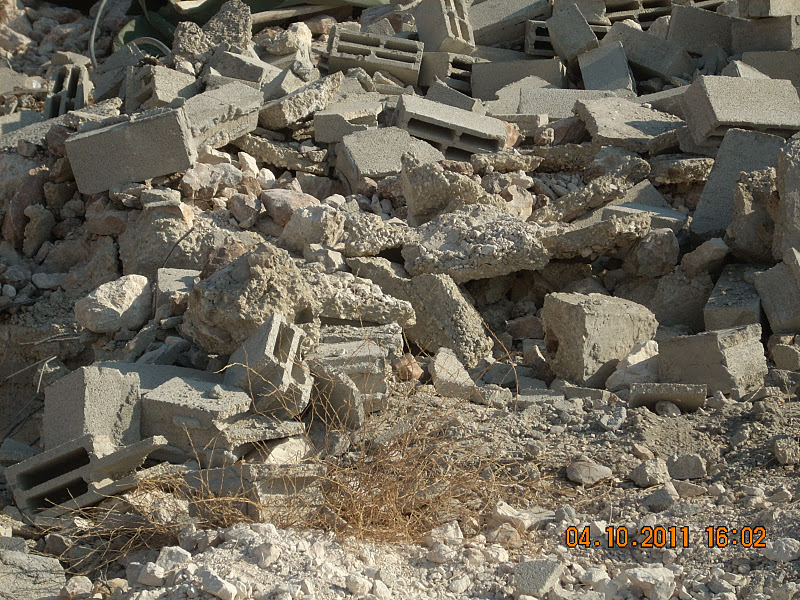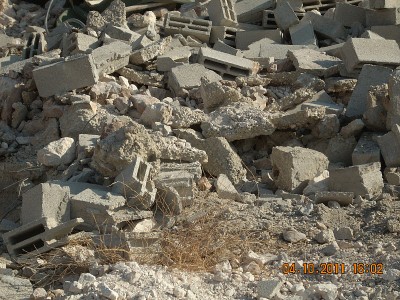by Alistair George
3 October 2011 | International Solidarity Movement, West Bank
Hundreds marched in Nablus today to protest against the harsh conditions endured by Palestinian prisoners in Israeli jails and to show solidarity with over 150 prisoners currently on hunger strike.
Prisoners from the leftist PFLP (Popular Front for the Liberation of Palestine) movement began open-ended hunger strikes – eating no food and drinking only salted water – on 27 September 2011 in several Israeli prisons, including Nafha, Askhalan and Ramon.
Palestinian prisoners issued a statement on 25 September 2011 demanding the Israeli authorities end solitary confinement for all prisoners and “end the policy of systematic humiliation by the occupation army against the Palestinian people at checkpoints and crossings, particularly targeting visitors to prisons, and end the arbitrary denial of visits to the prisoners, especially the prisoners from the Gaza Strip.”
Protesters are also demanding access to secondary and higher education in prisons – according to Addameer Prisoners Support and Human Rights Association there are at least 340 Palestinian children being held in Israeli prisons and protesters claim that many have been refused education and denied books whilst in Israeli prisons. According to protesters, prison authorities have frozen the accounts of some inmates, which they use to buy food and other supplies.
The protests have gathered momentum in the past week, spreading to several other prisons. Prisoners allied to other political parties have begun ‘limited’ hunger strikes – accepting no food from prison authorities and fasting for 2-3 days a week. Several people began a hunger strike today in Nablus in solidarity with family members in prison. They plan to stay in tents in Duwar, central Nablus, from the 4 October 2011 onwards as part of their protest.
Protesters converged outside the Red Crescent building in Nablus at 11:30 am today where several speakers, including the Mayor of Nablus and the Chairman of the Popular Committee to Support Palestinian Rights, spoke from a makeshift stage mounted on the back of a truck to call for Israeli to recognise the Geneva Conventions and respect prisoner rights in accordance with international law. They also called on the international community and Secretary-General of the United Nations, Ban Ki Moon, to pressure Israel to end the illegal occupation of Palestinian territory.
Protesters chanted and called for solidarity with political prisoners in Israeli jails and urging them to continue to resist. Many waved flags and held up photographs and placards bearing the faces of political prisoners. After the speeches were finished protesters marched past the western cemetery through the centre of the city Duwar, where the protest ended.
A significant number of the protesters were allied to the leftists group PFLP, alongside many supporters of Fatah and members of humanitarian organisations such as the Palestinian Prisoners Society. There were dozens of female protestors, many of whom were clutching photographs of family members currently incarcerated in Israeli prisoners. Protestors allied to Hamas and the smaller political parties were also present.
One female protestor, who declined to give her name, said that she was protesting to support the prisoners on hunger strike.
“I have a son in prison, he is serving a life sentence as he was a fighter with the PFLP. He has been on a hunger strike for seven days and he is in solitary confinement, but I have not been allowed to see him”.
Tahani Al-Shati’s husband has served 11 years of an 18 year sentence for being a fighter in the PFLP.
She said, “ I am worried about my husband as I heard today that he has been taken to an isolation cell because he began a hunger strike. Me and my children are very upset about this so I came to protest and to be in the struggle with the families of other prisoners.”
Bassam Gyias and Wafa Gyias were protesting to show support for their son Hassan who has served 3 ½ years of a 5 year sentence and began a hunger strike last week in protest at prison conditions. Yesterday, Hassan was transferred to an unknown location, along with 27 other prisoners affiliated to the PFLP.
Bassam said that they “are suffering because he hasn’t eaten anything for a few days; we feel sad but appreciate his resistance.”
According to the Palestinian Central Bureau of Statistics there were over 7,000 Palestinian prisoners in Israeli jails in 2010.
Myassar Atyani is the Director of the Cultural Committee in the PLO’s General Women’s Union and has campaigned on behalf of political prisoners from all parties for six years. She spent a month in solitary confinement in 2009.
“It was very small, dirty and cold. It was winter but they put a fan at the window and I was only given one blanket. I was shivering all the time. The tap constantly dripped, which gave me a headache and I couldn’t sleep as it was so noisy; either the guards were shouting or the Israeli prisoners were shouting, laughing or singing.” She says that being held in solitary confinement took a huge psychological toll on her; in addition to not being able to communicate with anyone, she was disturbed by a mirror placed in her tiny cell, which distorted her reflection. Atyani was only allowed to see her lawyer after eight days in prison – twice in total during the month.
Atyani says that prisoners in isolation cells are usually allowed one hour’s exercise a day, taken alone. She was not allowed any exercise whilst in prison and the cell was underground, so it was hard to tell whether it was day or night. Atyani says she kept track of the time through meal times and through the daily ritual of being made stand to attention in her cell at 6am, 10am, 6pm and 10pm. She scored marks into the walls to keep track of the days. She was only taken from her cell for interrogations, during which she sat in silence and picked at her nails.
She says that she was on hunger strike for a month, only having coffee and water with salt. “I was very ill; eventually I couldn’t stand or talk. I also had a severe earache whilst in prison and the Israeli’s didn’t let me have my medicine. Now, if there are loud noises, I find it hard to hear well and follow conversations”.
Atyani was released after a month; however her brother, who was arrested at the same time as her, was kept for a year in administrative detention – a practice in complete violation of human rights as sentences are based on confidential material kept from the detainee and their lawyer. According to Addammeer there are at least 750 Palestinians currently detained in Israeli jails without charge or trial.
Atyani is hopeful that the hunger strikes will help to unite different Palestinian factions; “Outside the prisons we need to be united and be stronger across all political parties so that the prisoners will also be strong.”
She is also keen to raise awareness abroad of the plight of Palestinian prisoners – “Some prisoners have been in solitary detention for 15 years and no one hears about this.”
Alistair George is an activist with International Solidarity Movement (name has been changed).



